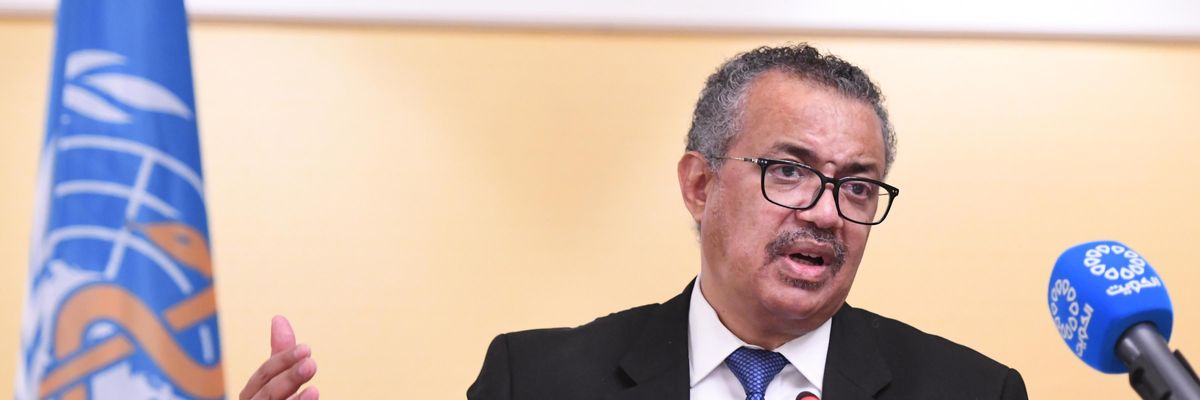
Tedros Adhanom Ghebreyesus, director-general of the World Health Organization, speaks at a press conference in Kuwait on July 28, 2021. (Photo: Jaber Abdulkhaleg/Anadolu Agency via Getty Images)
WHO Condemns 'Worldwide Failure' as Countries Spend Just 2% of Budgets on Mental Health
"We must heed and act on this wake-up call," said the head of the organization, "because there is no health without mental health."
\u201cThe world has failed to provide people with the #MentalHealth services they need: new Mental Health Atlas\nRead more\u27a1\ufe0fhttps://t.co/J0uKvKWZ46\u201d— World Health Organization (WHO) (@World Health Organization (WHO)) 1633689478
"It is extremely concerning that, despite the evident and increasing need for mental health services, which has become even more acute during the Covid-19 pandemic, good intentions are not being met with investment."
An Urgent Message From Our Co-Founder
Dear Common Dreams reader, The U.S. is on a fast track to authoritarianism like nothing I've ever seen. Meanwhile, corporate news outlets are utterly capitulating to Trump, twisting their coverage to avoid drawing his ire while lining up to stuff cash in his pockets. That's why I believe that Common Dreams is doing the best and most consequential reporting that we've ever done. Our small but mighty team is a progressive reporting powerhouse, covering the news every day that the corporate media never will. Our mission has always been simple: To inform. To inspire. And to ignite change for the common good. Now here's the key piece that I want all our readers to understand: None of this would be possible without your financial support. That's not just some fundraising cliche. It's the absolute and literal truth. We don't accept corporate advertising and never will. We don't have a paywall because we don't think people should be blocked from critical news based on their ability to pay. Everything we do is funded by the donations of readers like you. Will you donate now to help power the nonprofit, independent reporting of Common Dreams? Thank you for being a vital member of our community. Together, we can keep independent journalism alive when it’s needed most. - Craig Brown, Co-founder |
\u201cThe world has failed to provide people with the #MentalHealth services they need: new Mental Health Atlas\nRead more\u27a1\ufe0fhttps://t.co/J0uKvKWZ46\u201d— World Health Organization (WHO) (@World Health Organization (WHO)) 1633689478
"It is extremely concerning that, despite the evident and increasing need for mental health services, which has become even more acute during the Covid-19 pandemic, good intentions are not being met with investment."
\u201cThe world has failed to provide people with the #MentalHealth services they need: new Mental Health Atlas\nRead more\u27a1\ufe0fhttps://t.co/J0uKvKWZ46\u201d— World Health Organization (WHO) (@World Health Organization (WHO)) 1633689478
"It is extremely concerning that, despite the evident and increasing need for mental health services, which has become even more acute during the Covid-19 pandemic, good intentions are not being met with investment."

